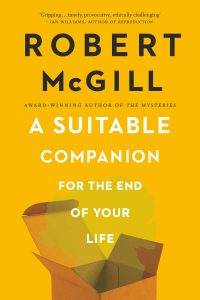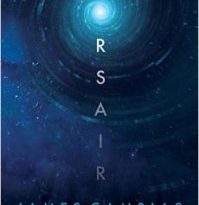Ultra 85 by Logic: Review by Ian Mond
 Ultra 85, Logic (Simon & Schuster 978-1-98215-827-9, $18.99, 304pp, tp) September 2024.
Ultra 85, Logic (Simon & Schuster 978-1-98215-827-9, $18.99, 304pp, tp) September 2024.
I’d never heard of the rapper Logic (AKA Sir Robert Bryson Hall II) or his work (both musical and literary) until I was sent a copy of Ultra 85. That’s not an indictment of Logic but instead speaks to my narrow, stunted musical tastes. Ultra 85 is Logic’s sophomore effort, the follow-up to his debut Supermarket, and of the three dystopian novels I reviewed, it’s the most conventional, presenting us with a clear-cut fascistic future that, Paul Verhoeven style (à la Robocop and Starship Troopers), leans more toward the satirical than the gritty verisimilitude of Hum. It’s also the most entertaining. A rhapsody of pop culture references, arse-kicking robots (well, one in particular), and high-octane action scenes.
Ultra 85 takes place in 2115, way out in deep space. Earth is a pile of rubble, nuked out of existence. Early in the novel, we’re given a handy chronology of events that begins with Royce Bonderman (in 2031) deciding that the true calling of our species – known as ‘‘The Cause’’ – was ‘‘the expansion of humankind across galaxies.’’ In 2046, the generational ship cum space station Babel is launched, ‘‘carrying 6.2 million people – civilians, scientists, engineers, and servicepeople’’ led by the Ultra 85, the founding families that supported Bonderman in realising his dream. Four years later, Babel discovers a dwarf planet, which they dub Paradise. Tidally locked and with limited resources, only the Ultra 85, their families and the best of the best from Babel, are permitted to colonise the world. The rest, like our protagonists, Captain Quentin Thomas and Private William Kai, explore the deep reaches of space, looking for much-needed resources like antimatter. If they’re exceptional at their job, they will be chosen to live on Paradise, much like Thomas’s father, who left for the dwarf planet when his son was twelve.
Pop culture, especially the tentpole films of the 1980s and 1990s, plays a pivotal role in Thomas and Kai’s daily life. Those movies distract from the monotony of deep space and inform their ideology and outlook. Having access to these films is an act of rebellion; back in 2051, the Ultra 85 banned all things frivolous, including most forms of entertainment, after a cataclysmic event that killed hundreds of thousands of people on Babel was ultimately blamed on the community’s failure to focus exclusively on ‘‘The Cause.’’ If that isn’t fascistic and repressive enough, via a series of close scrapes and coincidences that sees Thomas reunite with his father, he and Kai crash land on Paradise, where they discover that the Babel crew selected to live in the enclosed city of Elysium are forcibly reprogrammed to serve the Ultra 85.
For the seasoned genre fan, there won’t be much here that isn’t familiar. Societies like the authoritarian Babel and Elysium (with the latter a high-tech forced labour camp) have appeared in countless science fiction novels, most recently Some Desperate Glory by Emily Tesh (but really, you could throw a dart and hit any number of popular contemporary novels). The AI robot, Atom, powered by antimatter and fed a pop culture diet, reminded me of Baymax from Big Hero 6 and countless other heavily armed – albeit ‘‘cuddly’’ – mechas. But for all the familiarity, events happen so quickly and suddenly that I was unsure where Logic was taking the story until about the halfway mark. The inclusion of pop culture, with Thomas and Kai regularly referring to or quoting classic movies, also adds an interesting texture to the narrative, one that could start to grate if it wasn’t so cleverly integrated into the plot. Ultra 85 is also funny. The expletive-heavy dialogue is sharp and zippy, particularly the scenes where Thomas and Kai argue about their favourite films.
The relationship between Thomas and his father did not quite work for me, an encounter forty years in the making. While it’s initially emotional and awkward (for plot reasons, Quentin and his Dad are physically the same age, despite the four decades apart), not enough space is given to explore the emotional bonds between the two men. The same goes for the novel’s concerns about AI. While I appreciated Logic’s attempt to consider the danger the effects ‘‘five hundred fifty-seven terabytes of pop culture’’ will have on Atom’s burgeoning intelligence (having seen all those Nazi war films or the oeuvre of Tarantino, will Atom conclude that humanity is unsalvageable and wipe us all out?), it’s a discussion that mainly falls by the wayside once the action heats up.
Still, it’s hard to dislike Ultra 85. It’s not just the movie quotes (I laughed when Atom repeats Bill Pullman’s speech from Independence Day); it’s the way Thomas and Kai use cinema to navigate their life, to appreciate that their world is nowhere near as free, as open, as compassionate as the ones they see on the silver screen. And, unlike Hum and Napalm in the Heart, it’s a dystopian novel with the boldness to imagine a brighter future.
Interested in this title? Your purchase through the links below brings us a small amount of affiliate income and helps us keep doing all the reviews you love to read!
Ian Mond loves to talk about books. For eight years he co-hosted a book podcast, The Writer and the Critic, with Kirstyn McDermott. Recently he has revived his blog, The Hysterical Hamster, and is again posting mostly vulgar reviews on an eclectic range of literary and genre novels. You can also follow Ian on Twitter (@Mondyboy) or contact him at mondyboy74@gmail.com.
This review and more like it in the September 2024 issue of Locus.
 While you are here, please take a moment to support Locus with a one-time or recurring donation. We rely on reader donations to keep the magazine and site going, and would like to keep the site paywall free, but WE NEED YOUR FINANCIAL SUPPORT to continue quality coverage of the science fiction and fantasy field.
While you are here, please take a moment to support Locus with a one-time or recurring donation. We rely on reader donations to keep the magazine and site going, and would like to keep the site paywall free, but WE NEED YOUR FINANCIAL SUPPORT to continue quality coverage of the science fiction and fantasy field.
©Locus Magazine. Copyrighted material may not be republished without permission of LSFF.








